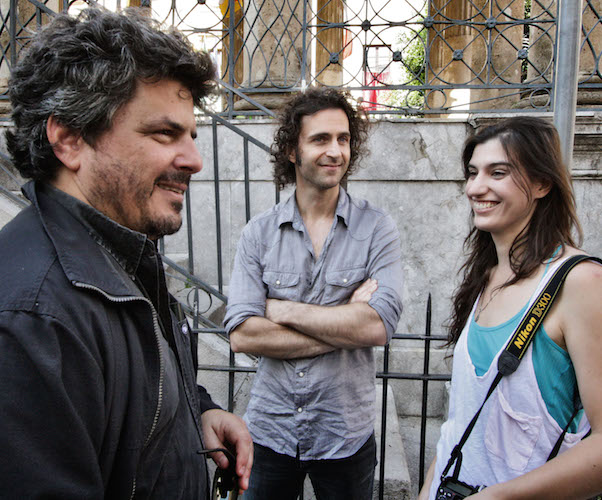Film Review: Remembrance of Things Zappa
Frank Zappa fans will enjoy an incisive look into a seminal period of the artist’s work, with its balance of sophisticated orchestral numbers and sardonic social commentaries on glitz, chintz, and cocaine.
Summer ’82: When Zappa Came to Sicily, directed by Salvo Cuccia. Screening at the Regent Theatre, Arlington, MA, at 7:30 p.m. on November 20.

A scene from “Summer ’82: When Zappa Came to Sicily”
By Scott McLennan
Frank Zappa was a brilliant, provocative and complex musician. But if you know that name, you probably already knew that about him. Zappa’s music, as you recall, could be ridiculously puerile even as it (and Zappa himself) demanded incredible skill and acumen to play it properly. Zappa was also a doting father, which maybe you did not know. And as we learn in this fascinating documentary, Summer ’82: When Zappa came to Sicily (receiving its regional premiere at the Regent Theatre) is also a source of pride for residents of the small town in Southern Italy where Zappa’s grandfather and father lived before the family emigrated to the U.S. in the early 20th century.
Filmmaker Salvo Cuccia packs a lot into this tightly framed 2014 documentary, which explores the impact that Zappa, who died in 1993, had as a musician and reveals interesting bits and pieces about his family and his personal life.
The film runs parallel storylines, one involving Zappa’s 1982 European tour , which concluded in Palermo with a show cut short as fans and police clashed. Another tangent concerns Cuccia’s own obsession with Zappa’s music, particularly his failed attempt to be at that Palermo concert.
Zappa’s wife Gail and three of the couple’s grown children end up meeting Cuccia in Italy; that encounter forms a third narrative facet.
Many years after the Palermo debacle, Cuccia began reconstructing the events surrounding the concert and struck up a relationship with Zappa’s family, which gave him access to archival film and audio recordings, including a wealth of material from the 1982 European tour.
Cuccia does an admirable job generating a portrait of Zappa in the early ’80s, touching on the unexpected pop hit of “Valley Girl,” a song Zappa recorded with daughter Moon Unit, and the rigorous (and often humorous) preparations for a major tour with a new band.
The filmmaker then examines a later trip that Gail, Dweezil, Moon Unit, and Zappa daughter Diva made to Italy, when they visited the town where Zappa’s father was born. The musician’s legacy had become the basis of a civic celebration; Zappa made the same trip in 1982, though it was hardly a heralded event.
Cuccia neatly layers all of these stories into his film, with considerable thanks to Massimo Bassoli, a bohemian spirit and Italian rock journalist who befriended Zappa in the ’70s. He hung around with him to the point that he was able to write a well-received biography of the musician. Bassoli accompanied Zappa throughout the 1982 tour and helped arrange the trip that Zappa made to his ancestral home of Partinico.
Bassoli is present in the early footage Cuccia weaves into his film; the writer is there 30 years after the 1982 European trek to accompany the visiting Zappas on their own pilgrimage to Partinico. The journalist contributes absurd irreverence one moment and heartfelt sincerity the next; in the court of King Zappa he played the role of both jester and confidante. This duel role makes him a wonderful guide, tying together the various strands of Cuccia’s tale.
The trips to Partinico become meditations as well as celebrations on the influence of heritage and family on art. Zappa’s music frequently veers toward the progressive and avant garde; yet the portrait of Partinico is undeniably quaint, Cuccia’s juxtaposition of the two examines the irony of overlapping (or is that clashing?) cultural values.
Tucked into all of this is Cuccia’s personal story of how he came to love Zappa’s music and the attempt he made to attend the ill-fated Palermo concert. At times, the director seems to be trying too hard to pull all of his story lines together, but by the end of Summer of ’82 he brings it all together and offers some surprising “a-ha” moments.
Zappa fans will enjoy this incisive look into a seminal period of the artist’s work, with its balance of sophisticated orchestral numbers and sardonic social commentaries on glitz, chintz, and cocaine. Guitar virtuoso Steve Vai, who gained his professional footing as a young hotshot in Zappa’s band, is among those interviewed, and he helps set the scene for all that went wrong at the Palermo concert.
The Palermo debacle, however, was not a total loss, because the trip drew Zappa, his family, and his admirers into a deeper exploration of the bonds and relationships that influence creativity.
Since the 2014 release of Summer ’82, Gail Zappa has died, and the Zappa kids have split into two factions, each fighting over the handling of their father’s music, a situation that will strike viewers as an unfortunate coda to the story told by this film.
Note: Dweezil Zappa, who for years has performed his father’s music in concert, will be at the Regent screening and will take part in in a Q&A session after the film.
Scott McLennan covered music for the Worcester Telegram & Gazette from 1993 to 2008. He then contributed music reviews and features to The Boston Globe, The Providence Journal, The Portland Press Herald and WGBH, as well as to the Arts Fuse. He also operated the NE Metal blog to provide in-depth coverage of the region’s heavy metal scene.
Tagged: documentary, Dweezil Zappa, Frank-Zappa, Moon Unit Zappa, Salvo Cuccia, Scott McLennan
